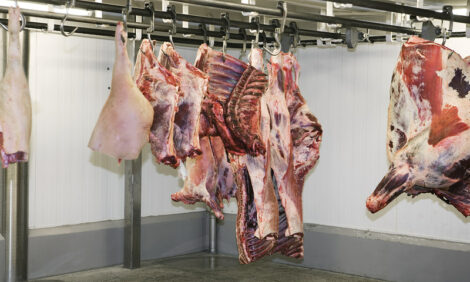



Data Draws Gulf in Cattle and Beef Trade
US - As the US Congress continues to make overtures about the passage of the U.S. – Colombia Free Trade Agreement, cattlemens' action group, R-CALF, points to trade data presented at its 9th annual convention, which they say show Congress should reconsider the implications of all future free trade agreements (FTAs) on the U.S. cattle and beef industries.“The data presented at our convention reveal that the benefits promised to cattle producers have not materialized and, in fact, these FTAs have resulted in a huge deficit for our industry,” said R-CALF USA National Membership Committee Co-Chair Joel Gill, who served as master of ceremonies for the recent convention in Omaha, Neb. “These FTAs also have distorted incomes in America.”
Lori Wallach, Public Citizen’s Director of Global Trade Watch, provided convention participants with a dynamic, “big picture” overview of current trade policy outcomes. The combined trade in U.S. livestock and meat products with countries that already have an FTA with the U.S. resulted in a trade deficit of nearly $2 billion in 2007 for those commodities, she said.
* "The cattle industry alone experienced an exodus of about 120,000 cattle operations during this same period." |
|
Eric Nelson,co-chairman of R-CALF Trade Committee
|
“NAFTA (North American Free Trade Agreement) led to a massive increase in our trade deficit, and our deficit with South American countries (such as Chile and Nicaragua) can be explained by the fact that these nations are too poor to be able to buy very many American products,” Wallach pointed out.
The trade model currently being used by the U.S. for both implemented and pending FTAs, including the pending U.S.–Columbia FTA, is the trade model developed in both the World Trade Organization (WTO) and NAFTA. Wallach said the reality is that this trade model has resulted in “broken promises” to U.S. agriculture producers.
“During the NAFTA-WTO period (1993-2005), nearly 300,000 U.S. family farmers have gone under, and the price paid for inputs has outstripped the price received by farmers for their products,” she concluded. “The NAFTA-WTO trade rules empowered increasingly concentrated agribusiness trading companies to game the system, playing farmers off of each other with ever declining prices, caused in part by flooding markets with imports to keep down prices.”
R-CALF USA Region VII Director Eric Nelson said he agrees with Wallach’s conclusion.
“The cattle industry alone experienced an exodus of about 120,000 cattle operations during this same period,” said Nelson, who also co-chairs the group’s trade committee.
Nelson said it is irresponsible for Congress to continue subjecting the U.S. cattle industry to FTAs with a proven track record of producing livestock and meat deficits.
“The U.S.-Colombia FTA should not be approved at least until the FTA is rewritten to include provisions that would protect U.S. cattle producers from import surges and U.S. consumers from meat produced under substandard conditions,” he urged.
R-CALF USA’s voting members will soon vote via mail-in ballot on a policy resolution nominated during the convention that would directly impact the U.S.–Columbia FTA. If passed, the resolution would call on Congress to declare a moratorium on new trade agreements until a top-to-bottom review has been completed on existing trade agreements and a report is generated to assess the actual, versus promised, results from those trade agreements.
TheCattleSite News Desk


